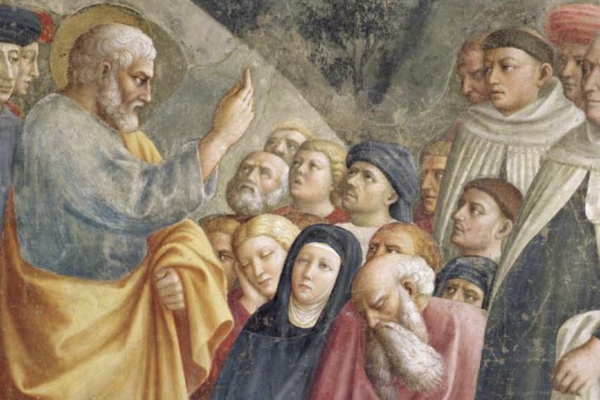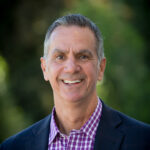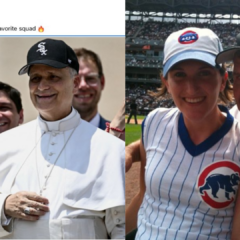This post originally appeared on Trans-Missions, the USC Knight Chair in Media and Religion site.
Last week I spent a day at the annual Evangelical Theological Society meetings in San Francisco. My entree to the event was an invitation from some colleagues who are working on an project linking theological reflection and California culture, which allowed me to get a closer look at
a gathering of several hundred evangelical theologians, biblical scholars, philosophers, pastors and political interlocutors—in effect, the brain trust of conservative American evangelicalism.
I went fully expecting to hear the working out of the theological and philosophical arguments that underlie the strident voices that emanate from the religious right. While there was a bit of shrill posturing (apparently some religions—one in particular—could legally be outlawed, according to
one point of view), most of the sessions amounted to earnest attempts to uncover and present deeper thinking and reflection about the Christian scriptures, how Christians should live in the world and how they might have a positive influence in American culture.
I wasn’t surprised to see that most (85 percent or more) of the participants were white men. Still, there was what appeared to be a good number of blacks in attendance (in addition to a scattering of other minorities). But like the phenomenon described in the book Why Are All the Black Kids
Sitting Together in the Cafeteria? the non-whites gravitated toward one another in the conversations between sessions. This in itself isn’t too surprising, given the isolation that many people of color experience at evangelical colleges and seminaries, which tend to be overwhelmingly white.
Equally unsurprising was the assertion that threaded through a couple of prominent sessions: that secularism and relativism are eroding the character of American citizens (Christian and non-Christian alike) and, by extension, religious institutions and the country as a whole. The cure for this affliction, at least according to one presenter, is the re-creation of Western Christian civilization, based on Christianized Platonic ideals, one (presumably home-schooled) child and parent at a time. This call to action was of course couched in sufficiently nebulous terms–and included the requisite link to C.S. Lewis (an evangelical go-to scholarly reference in any moral argument)—to make it palatable enough for general consumption. After all, who doesn’t want a moral citizenry striving for the public good?
What I wasn’t prepared for, however, was the genuinely warm reception I received from people I know but haven’t seen in several years. Other surprises were the many pastors both on the program and in attendance as well as the number of spouses (mostly wives, since most of the participants were men)—and children in some cases—actually sitting in on the sessions.
And I was mildly (and somewhat pleasantly) shocked by what conservative firebrand Chuck Colson had to say. He argued for reinfusing a sense of personal morality into American culture and using that call—and his new video series—to emphasize the necessity of personal morals for the preservation of a truly free society. Nothing remarkable there. Yet while I was fully expecting Colson’s argument to lead toward some sort of crypto-Dominionist utopia, instead he said that in his view a free society could not be a theocracy of any sort and must avow a commitment to a free exchange of ideas, religious or otherwise. Where were the torches and pitchforks?
Of course due suspicion is warranted; these were events open to the public, after all. But journalists should nonetheless try to look for greater depth and complexity in their stories about conservative evangelicals and religion more generally. A conference that arguably constituted a sampling of Republican primary voters attracted people who are not only ardent in their beliefs but thoughtfully committed to civil discourse, per Chuck Colson. This suggests that there are more interesting stories to be told about religious conservatives than those that simply focus on titillating personalities like Sarah Palin, Rick Perry and Michele Bachman. These politicos, along with Rick Warren, currently serve as stand-ins for tens of millions of conservative American evangelicals in most news media narratives, but they’re essential spiritual versions of the infamous 1 percent decried by Occupy Wall Street. In other words, they don’t live in the day-to-day world that 99 percent of the evangelicals in the U.S. actually inhabit. Like the ranks of religious progressives and centrists, on whom the gaze of the news media also seldom turns, most evangelical conservatives are just trying to make ends meet, raise their children as best they can and follow their religious beliefs as they encounter the good, the bad and the puzzling in everyday life.
It is thus crucial for the news media to provide a more nuanced and accurate view of the roughly 80 million people in the U.S. who identify as evangelicals. They exert enormous influence in every national election, in various legal fights and in the communities in which they live. As such, they should neither be ignored nor characterized by the actions and proclamations of their most publicity-hungry members. By focusing narrowly on the famous (or infamous), whether political or pastoral, journalists skew the public perception of all forms of religion in the public sphere. This tight frame presents evangelicals as unworldly and easily befuddled (a la Palin, Perry and Bachmann) or not particularly deep theologically (a la Warren) rather than complex in their range of everyday needs, desires, fears and dreams. Apart from distorting reality, these media narratives don’t simply record the skirmishes in the culture wars–they also serve to stoke the conflict.
Reporters would do well to spend time in different evangelical institutions—churches, schools and even academic conferences—to see what the evangelical 99 percent is actually all about. You might be surprised to discover that they’re not so different from you and me.
Richard Flory is the executive director of the USC Center for Religion and Civic Culture.








